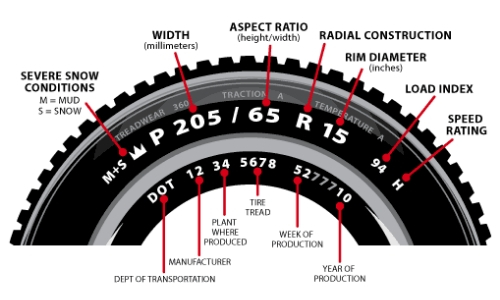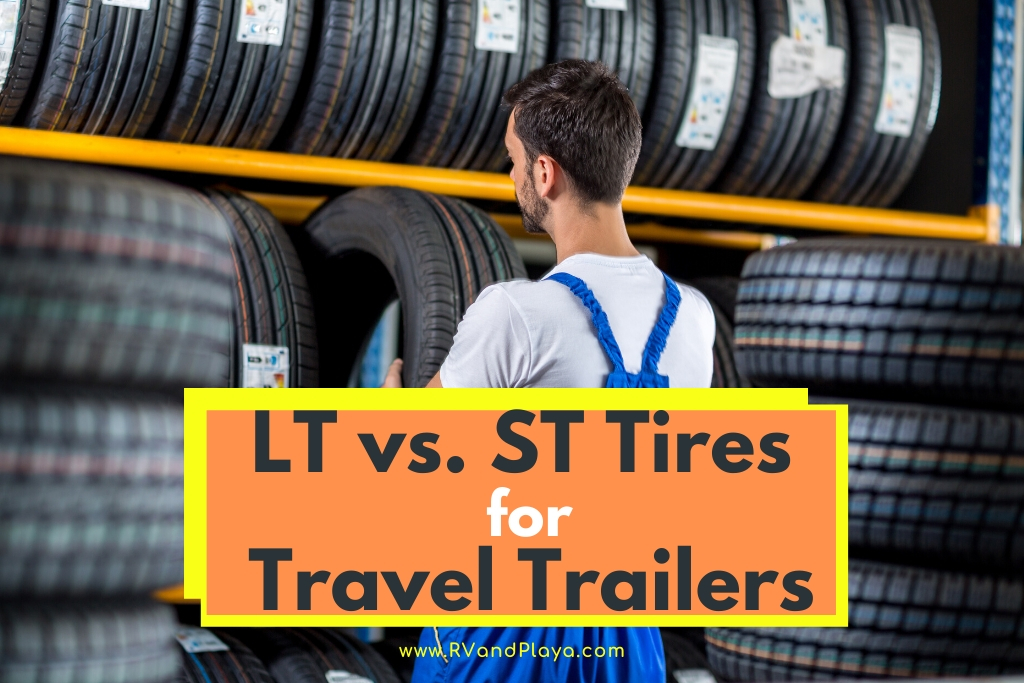As the popularity of travel trailers continues to grow, a long-standing debate remains unresolved: what type of tire works best for travel trailers? LT (light truck) and ST (special trailer) tires are different in several ways, and exhaustively understanding the differences between them is an essential step in determining which option is best.
Are LT or ST Tires better for travel trailers? A high-quality ST tire is the best option for travel trailers, as they are designed specifically for trailer applications. LT tires can be used on trailers, but they are not the preferred option among experts, as their construction is slightly different and not optimized for use on trailers.
This is a conclusion that is not arrived to lightly, and there are a number of different variables that go into making it. Tires are a very complex and carefully engineered piece of equipment, and simply knowing which is best is not nearly as important as knowing why which is best. So, let’s get to work on better understanding the things that make ST tires ideal for travel trailers, and LT tires a second-place option.
Table of Contents
What is the Difference Between ST and LT tires?
LT and ST tires are designed and manufactured differently as a function of their dissimilar intended use. It’s important to break down exactly how these two tires are different, and the pros and cons of using each option in different scenarios.
As a sort of introduction, the primary difference between ST and LT tires is the way that they are built. ST tires are constructed using different materials than LT tires, and these differences, designed to make ST tires better at withstanding the added load of a heavy trailer, are what make ST tires the best choice for travel trailers.
IMPORTANT TIRE INFO YOU SHOULD KNOW – RV VS LT >> Check out the video below
ST Tires
As mentioned above, ST stands for “special trailer,” and tires carrying this designation are explicitly designed for use on non-steering and non-driven axles (for use on trailers). This means that they absolutely cannot be used on the actual tow vehicle, and are only suitable for use on trailers.

This very specific intended use is a result of the way that ST tires are constructed, which differs quite a bit from LT or P (passenger) tires. Let’s take a look at some of those differences:
- Reinforced Sidewalls: The most significant difference between ST and LT tires is that ST tires have a more strongly reinforced sidewall. This is achieved by using more durable, larger steel cables and cords within the tire. The importance of a strong sidewall cannot be overlooked in travel trailer applications: travel trailers are heavy, and it is crucial to have a tire that will not fail under all of that weight. Additionally, having a tire with a sturdy sidewall will ensure that the tire remains rigid while the trailer is turning, preventing the tire’s shape from changing or folding altogether under cornering.
- Speed Rating: ST tires are all capped at a standard speed rating of 65mph, whereas LT tires have varying speed ratings. This speed-rating limit is again a result of the way that ST tires are constructed, and the manufacturers have deemed them suitable only for use up to 65mph. Additionally, it’s likely that a portion of the reasoning behind this speed rating limit is simply because trailers shouldn’t be going over 65mph anyway.
- Load Rating: Because of their reinforced sidewall and more robust steel cable and cord construction, ST tires generally have higher load ratings than LT tires. These higher load ratings are intended to reflect the tires increased ability to handle the load of a heavy travel trailer. Admittedly, there are LT tires that can match the load ratings of an ST tire, but ST tires are far more likely to come standard with a load rating high enough to withstand the extra load that being hooked up to a trailer puts on a tire.
- Tread pattern: While this difference hardly affects the tires’ ability to bear the load of a trailer, it is a difference that deserves mentioning, nonetheless. ST tires generally have tread patterns that are less intricately designed than LT tires and are not intended for applying traction under power, as ST tires are only to be used on non-driven axles. While this is largely unimportant as you’ll never be using an ST tire on a driven axle, it’s something that you should be aware of regardless.
- Treadwear and tire longevity: ST tires generally do not last as long as LT tires. This is because ST tires are subject to much higher load conditions than LT tires, which can degrade both the tread and internal construction of the tire. Because ST tires are always under a relatively high load, their internal components are more likely to deteriorate quickly because of the added stress of the job that they are designed to do: support a very heavy trailer.
LT Tires
As we mentioned, LT stands for “light truck,” and tires that carry this designation are designed for use on light trucks and SUVs. It’s important to note that LT tires are not intended for use on trailers; however, many travel trailer owners use them for this application anyway because they have some aversion to ST tires, which we will address shortly. Before we do, though, let’s take a look at what is required for a tire to be designated “LT.”
- Load rating: There are many things that go into calculating a tire’s load rating, and their culmination is the primary differentiator amongst LT and other types of tires. LT tires have a higher load rating than P rated tires, but a lower rating than ST rated tires. This is because LT tires need to be able to support the weight of a truck or SUV, whereas P tires are to be used on sedans, coupes, and other lighter-weight vehicles.
- Construction and tread material: While this is a factor within the load rating, it is worthy of separate mention because of the significance of the role it plays in increasing an LT tire’s load rating. LT tires are made of a rubber compound that is more robust than passenger tires, helping it to withstand the added load of a light truck or SUV. Additionally, many LT tires have more reliable cables and cords that make it more adept at performing well in high load-bearing situations.
Related reading: Can You Use Truck Tires on Travel Trailers?
Why Are ST Tires Better than LT Tires for Travel Trailers?
This is likely the question that you’re dying to have answered, so we’ll just go ahead and tell you: ST tires are better for travel trailers than LT tires because they are designed for the job.
It should come as no surprise that a tool designed for doing a specific job is better suited to do so than a tool designed to do another job. Tire manufacturers spend a lot of time, money, and resources to make ST tires that are perfectly designed to work well on trailer axles, so there is absolutely no reason to doubt their ability to do so or consider using a different type of tire.
They have an appropriate load rating and specialized construction to ensure that they are, in fact, the ideal choice for use on a trailer. So, this begs the question, why would anyone use anything but an ST tire on their trailer?
Why Are Some People ST Tire Averse?
There are quite a few reasons that people prefer to use LT tires over ST tires for their trailers. From faulty mid-2000s manufacturing practices that lead to ST tire blow-outs, to speed demons wanting to take flight in their trailers, there are a number of reasons that have led people to believe that LT tires are better for travel trailers.
However, the fact of the matter is that they most definitely are not. So, let’s take some time to dispel the various reasons that lead people to believe that anything but an ST tire is best for trailer applications.
Manufacturing Issues
In the mid-2000s, there was a string of ST tires that were manufactured incorrectly, and this led to those tires being more prone to blow-outs than they should’ve been. The impact that this had on the consumer attitude towards ST tires was profoundly negative.
Because of this string of faulty ST tires—which was nothing more than a manufacturing mishap and fluke—consumers were led to believe that all ST tires were prone to blow-outs and that they were generally of poor quality, as LT tires were not subject to this same manufacturing hiccup.
However, this was, of course, not true. All ST tires were not bad, there was just a series of bad batches manufactured, and folks jumped to the conclusion that this was an issue plaguing all ST tires.
So, what exactly went wrong? As with any manufacturing mishap, it’s difficult to pinpoint the exact batch of tires that was faulty, and the reason for their ineffectual performance. However, RVing With Mark Polk cites the bad manufacturing occurred between 2005 and 2008, primarily in Chinese-manufactured tires. Additionally, tires manufactured after 2010 were free of any defects. As it is extremely unlikely to find a pre-2010 tire on the road today, faulty manufacturing should be a non-issue for people deciding between ST and LT tires for their travel trailer today.
Speed Ratings
Another reason that leads some consumers away from using ST tires on their travel trailers is the relatively low speed rating of 65mph. This speed is well below the legal limit in more rural parts of the United States, and often people towing travel trailers are traveling extremely long distances.
Combined, these two things lead people to prefer LT tires, as they will allow them to travel faster and thus save them time. There are a few reasons as to why this is not a legitimate reason to opt for an LT tire over an ST tire for your travel trailer.
- For one, speed should never be your top concern when you’re towing a trailer. Towing a large trailer is a significant undertaking, and people that chose to do so have the added responsibility of keeping them and others on the road safe, as a trailer can be very dangerous when towed incorrectly. Therefore, it is probably best practice to keep your trailer under the 65mph ST tire speed rating anyway, as speeds above that can be dangerous with a large trailer, regardless of how experienced the driver is.
- Additionally, it is likely that an ST tire’s 65mph speed rating is equal parts the tire’s ability to handle that speed and the manufacturers wanting to deter people with trailers from exceeding 65mph. So, it’s probably wise to listen to the engineers who feel that 65mph is a reasonable, safe speed for people towing a travel trailer.
However, if that argument does not convince you that ST tires are not as bad as they seem, perhaps knowing that the speed rating of ST tires can be increased will help sway you in the right direction.
Many ST tire manufacturers cite their tires as being able to exceed the 65mph speed rating if the cold tire inflation pressure is increased by 10psi. While we would typically advise against doing this, it is an option for the folks that are set on traveling above 65mph. Using the increased tire pressure method will give you the added structural rigidity that makes an ST tire ideal, while also providing one the ability to travel at slightly higher speeds if they desire to do so.
ST Tire Longevity
The final primary reason that leads people to opt for LT rather than ST tires is that LT tires do tend to last longer. ST tires’ tendency to last for fewer miles is a result of the increased load that they are designed to withstand. Because ST tires often see higher load situations more frequently than LT tires, they do tend to wear out more quickly. However, they usually wear out internally first, with their internal construction degrading more rapidly than their treads, which is something to watch out for (though this can largely be avoided by using the right tire pressures).
However, as with the speed rating issue discussed above, trailer-pullers should be more concerned with the tire’s ability to withstand the added load of supporting a trailer than they are with being able to eke out every last mile from their tire. While longevity certainly can be a concern from a cost-perspective, especially for folks who are pulling their travel trailer often, it should not take priority over having a tire that is correct for the job.

The Best ST Tires to Buy
Now that we’ve thoroughly discussed the reasons that make ST tires the ideal candidate for travel trailers, let’s take a brief look at some of the best ST tires available on today’s market, as determined by TheDrive.
- Maxxis Radial Trailer Tire: Maxxis has been a name stay in the trailer tire industry for quite a while now, so it is no surprise that their products are absolutely top-notch. The Maxxis Radial is the top overall pick, with a 2,540lb weight rating, and advanced rubber and steel belt construction.
- Trailer King ST Radial Trailer Tire: The Trailer King ST Radial Trailer Tire was given the best value mark in TheDrive’s exploration of the best ST tires, but don’t let that fool you into thinking that it’s a pure budget option. The Trailer King still has a respectable 1,480lb weight rating, and features specifically designed treads to improve road-handling.
- Carlisle Radial Trail HD Trailer Tire: Picked as an honorable mention by TheDrive, the Carlisle Radial Trail HD Trailer Tire is a suitable all-around option, should the above two choices not be of interest to you. With a 2,150lb and even-wearing tread pattern design, these are an excellent option for anyone looking for a high-quality ST tire.
The above options are all great picks for people looking into a new set of ST tires for their travel trailers, just be sure to do your own independent research, as they do all come with their own unique set of pros and cons.
Final Thoughts
As has been evidenced herein, there are a number of different considerations that go into choosing the best tire for your travel trailer, yet the favorable choice is rather clear: ST tires. While there are certainly benefits to using LT tires, such as increased longevity and higher speed ratings, these pros are vastly outweighed by the most significant con: LT tires are not designed for use on trailers, whereas ST tires are.
Quite simply, if a tool is designed and engineered specifically for a particular job, it is probably the best option for consumers looking to get that job done. So, if you need to tow a travel trailer, an ST tire is the tool that you should be using to get that job done the right, and most importantly, the safe way.
Frequently Asked Questions
Here are a few common questions people often have about LT and ST tires:
Recent Posts
Is Toyota Remote Connect Free? (Subscription, Services Plans)
Does Toyota Remote Connect have an included trial? It used to be the case that, when you bought a new car, you made one straightforward payment and that was it. Now, it feels like there are...
Toyota Safety Connect: What It Is And Why You Need It? Whether you’re buying a new Toyota or you’ve had one for a while you will have been given the hard sell on their Connected Services but do...

